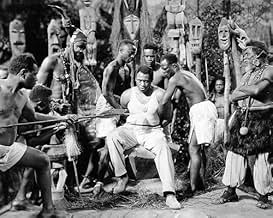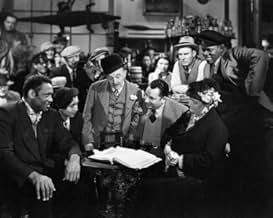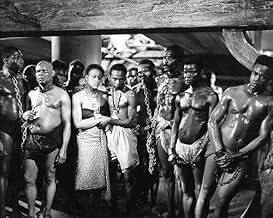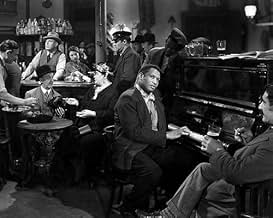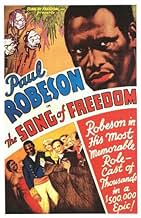PUNTUACIÓN EN IMDb
6,4/10
453
TU PUNTUACIÓN
Añade un argumento en tu idiomaA black British dockworker named Johnny Zinga becomes a famous singer and learns that he is the rightful king of the African island of Casanga.A black British dockworker named Johnny Zinga becomes a famous singer and learns that he is the rightful king of the African island of Casanga.A black British dockworker named Johnny Zinga becomes a famous singer and learns that he is the rightful king of the African island of Casanga.
Elisabeth Welch
- Ruth Zinga
- (as Elizabeth Welch)
Bernard Ansell
- Sir James Pyrie
- (as Bernerd Ansell)
Cornelia Smith
- Queen Zinga
- (as Miss C. Smith)
Sydney Benson
- Gate-Keeper
- (sin acreditar)
Cathleen Cavanagh
- Woman
- (sin acreditar)
Alf Goddard
- Alf, the Bartender
- (sin acreditar)
Reseña destacada
This film made Paul Robeson proud, and it also garnered high approval from leading black intellectuals at the time, such as Langston Hughes. In its first half it's very easy to see why. The story is far-fetched, but it shows black people as regular folks amongst the working-class of London, without stereotypes, and the desire on the part of one of them (Robeson) to find out where his ancestors were from. In flashing through a couple of centuries, it also showed a sample of some of the horrors of slavery, and we see a clear link to how that caused Robeson's character to be tragically disconnected from his past.
Hearing Robeson perform six songs was quite a treat, and 5-stars on its own. The second, "Sleepy River," which we see with a montage of people listening to his wonderful voice at night, is particularly stirring. Meanwhile, Elisabeth Welch is such a cutey pie as his wife, and more importantly, she's also a real person and not some mammy/servant stereotype. We even get to hear her reprise the song "Sleepy River" at the end, which was wonderful.
The film falters a bit in its second half when Robeson's character makes his way back to his ancestral island, and discovers it run by superstitious, backward people. The characterization felt troublesome, particularly since Robeson seeks to improve their life with the advances he's learned growing up in a European culture, one the film shows to be superior in every respect. On the other hand, at least it's a black man who has come to do this, and a strong, talented, intelligent black man at that. There is something moving at the heart of wanting to find your ancestral land, and to help the people living there.
I might have knocked my rating down a bit because of the problematic bits, or because the interaction Robeson has with the Africans seemed so implausible, but I kept in mind the film was made in 1936. The contrast of Robeson and Welch's characters to what was being spewed out in Hollywood at the time for African-Americans is striking, and undeniable. I enjoyed watching them here, and for the film's musical numbers and the progress it represented, was glad I saw this.
Hearing Robeson perform six songs was quite a treat, and 5-stars on its own. The second, "Sleepy River," which we see with a montage of people listening to his wonderful voice at night, is particularly stirring. Meanwhile, Elisabeth Welch is such a cutey pie as his wife, and more importantly, she's also a real person and not some mammy/servant stereotype. We even get to hear her reprise the song "Sleepy River" at the end, which was wonderful.
The film falters a bit in its second half when Robeson's character makes his way back to his ancestral island, and discovers it run by superstitious, backward people. The characterization felt troublesome, particularly since Robeson seeks to improve their life with the advances he's learned growing up in a European culture, one the film shows to be superior in every respect. On the other hand, at least it's a black man who has come to do this, and a strong, talented, intelligent black man at that. There is something moving at the heart of wanting to find your ancestral land, and to help the people living there.
I might have knocked my rating down a bit because of the problematic bits, or because the interaction Robeson has with the Africans seemed so implausible, but I kept in mind the film was made in 1936. The contrast of Robeson and Welch's characters to what was being spewed out in Hollywood at the time for African-Americans is striking, and undeniable. I enjoyed watching them here, and for the film's musical numbers and the progress it represented, was glad I saw this.
- gbill-74877
- 27 oct 2021
- Enlace permanente
Argumento
¿Sabías que...?
- CuriosidadesPaul Robeson performs a scene from Louis Gruenberg's operatic version of "The Emperor Jones". He earlier had starred in Eugene O'Neill's original play on Broadway (1923) and in the film version The Emperor Jones (1933).
- Citas
Gabriel Donozetti: What's the matter the color of his skin, when he has color in his voice! Power! Beauty! I go fighting!
- ConexionesFeatured in That's Black Entertainment (1990)
Selecciones populares
Inicia sesión para calificar y añadir a tu lista para recibir recomendaciones personalizadas
Detalles
- Fecha de lanzamiento
- País de origen
- Idiomas
- Títulos en diferentes países
- Song of Freedom
- Localizaciones del rodaje
- Empresa productora
- Ver más compañías en los créditos en IMDbPro
- Duración1 hora 20 minutos
- Color
- Relación de aspecto
- 1.37 : 1
Contribuir a esta página
Sugerir un cambio o añadir el contenido que falta

Principal laguna de datos
By what name was Un trono por una canción (1936) officially released in India in English?
Responde



